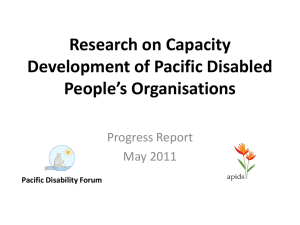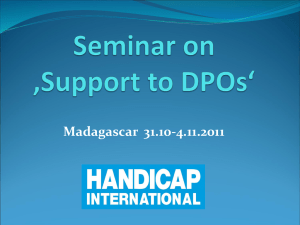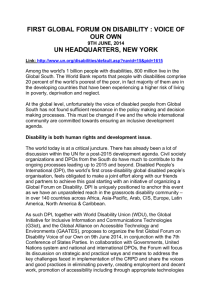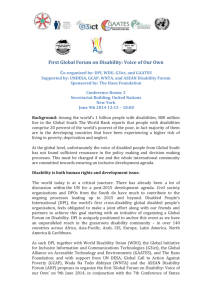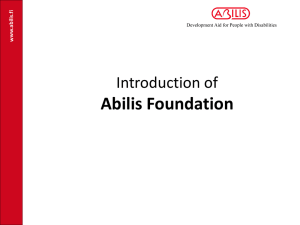now - Trust for London
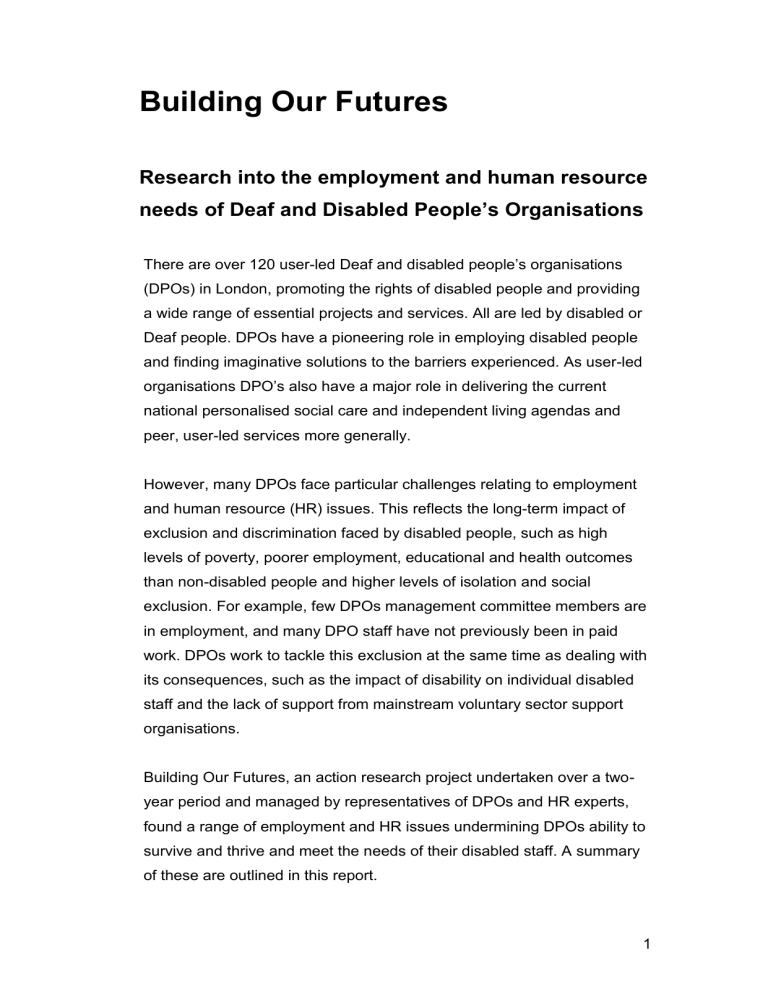
Building Our Futures
Research into the employment and human resource needs of Deaf and Disabled People
’s Organisations
There are over 120 userled Deaf and disabled people’s organisations
(DPOs) in London, promoting the rights of disabled people and providing a wide range of essential projects and services. All are led by disabled or
Deaf people. DPOs have a pioneering role in employing disabled people and finding imaginative solutions to the barriers experienced. As user-led organisations DPO’s also have a major role in delivering the current national personalised social care and independent living agendas and peer, user-led services more generally.
However, many DPOs face particular challenges relating to employment and human resource (HR) issues. This reflects the long-term impact of exclusion and discrimination faced by disabled people, such as high levels of poverty, poorer employment, educational and health outcomes than non-disabled people and higher levels of isolation and social exclusion. For example, few DPOs management committee members are in employment, and many DPO staff have not previously been in paid work. DPOs work to tackle this exclusion at the same time as dealing with its consequences, such as the impact of disability on individual disabled staff and the lack of support from mainstream voluntary sector support organisations.
Building Our Futures, an action research project undertaken over a twoyear period and managed by representatives of DPOs and HR experts, found a range of employment and HR issues undermining DPOs ability to survive and thrive and meet the needs of their disabled staff. A summary of these are outlined in this report.
1
Key Findings
London’s DPOs provide employment and volunteering opportunities for significant numbers of disabled people.
The work of DPOs is significantly hampered by their limited managerial and human resource capacity and expertise.
Recruiting appropriately skilled disabled staff and meeting their access needs and costs can be difficult.
Managing performance issues, particularly related to access and impairment related issues, can be problematic.
DPOs are often isolated from wider voluntary sector support networks.
There is a lack of appropriate, tailored support and resources on employment and human resource issues for DPOs to access.
The real costs of managing and running DPOs and accessible services are not recognised by funders.
What is a Disabled People’s Organisation?
DPOs are organisations run and controlled by Deaf and disabled people, and are committed to human rights, inclusion and removing the barriers faced by Deaf and disabled people in society. London’s DPOs are small voluntary organisations and most employ between 1 and 20 staff, mainly part-time. They are a voice for the concer ns of London’s 1 million Deaf and disabled people.
2
Detailed Findings
Staff in DPOs
Working in a DPO is a positive experience for most disabled staff, who show a high level of personal and professional commitment to their work and their users.
Opportunities for career development within DPOs are limited.
Recruitment
Recruitment takes longer and can be more expensive due to difficulties recruiting skilled and experienced disabled staff. Where less experienced staff are recruited, induction and training takes more time and has implications for project outputs and outcomes.
Part-time staff
DPOs employ a greater proportion of part-time workers, whilst this brings benefits, it also means more people to manage and more support to negotiate.
Meeting the access needs of disabled staff
Though half of the disabled workers within DPOs said their access needs were met an equal number said they were not and reported a lack of discussion about impairment, concern about disclosure, a perceived hierarchy of impairment within DPOs and limited understanding of others impairment and access needs.
There are fundamental problems within the Government’s Access to
Work scheme. These include: a lack of understanding and awareness about the scheme – both by disabled people and employers; the policies and procedures do not meet full access costs; the implementation of the scheme by local officers which can lead to delays and difficulties.
Staff in DPOs are more likely to use personal assistants (PAs) than in other organisations. There is a lack of clarity from Access to Work
3
regarding the employment of PAs, including their employment status, responsibility, impact on physical space and funding.
Sickness absence
Sickness absence relating to impairment/disability is regarded within
DPOs as a serious problem. Long-term sickness absence can seriously impact on a DPOs ability to deliver a project or service and puts pressure on other staff, particularly managers who provide cover for absent colleagues.
Employing agency staff or consultants to cover staff sickness (or if a
DPO is unable to recruit) can be useful but is a very expensive shortterm solution that also requires significant management input.
Managerial capacity and expertise
Flat management structures, where Chief Executives (CEOs) supervise the majority of staff, are typical within DPOs and put huge pressures on them and severely limit the development of an organisation.
Chief Executives or sole workers are often isolated and are not obtaining the specialist support they need from their Board members or from second tier support organisations.
There can be tensions between being inclusive by supporting disabled staff and getting the best performance from staff.
Many CEOs, most of whom are disabled themselves, reported a lack of confidence in managing performance, particularly related to access and impairment related issues. Many also have little time to update their knowledge and skills on these issues.
Internal HR policies and procedures are in need of updating but disability specific resources are scarce.
The real costs of managing and running DPOs and accessible services are not recognised by funders.
4
External support
There is a lack of appropriate and accessible HR training and support that meets the specific needs of DPOs.
There is concern about a lack of understanding of the needs of DPOs amongst mainstream second tier support organisations, trade unions, the statutory sector and funders.
DPOs try and get support from wherever they can, sometimes using expensive services that cannot fully meet their needs.
Whilst networking opportunities through Disability Lib are increasing, there is insufficient networking or sharing of knowledge, information and experience by DPOs.
5
Recommendations
Training and support
The setting up of two London networks to provide training, peer support and information sharing for Chief Executives and for DPO management
Committees.
The creation of a new, tailored and accessible HR training package specifically for DPOs. This package of training should include, as well as more generic HR issues around employment good practice, courses on sickness/impairment/disability and performance; Access to Work issues; employing personal assistants and Disability Equality Training.
The development of a HR support service specifically for DPOs, modelled on LVSC’s PEACe HR project for Black and Ethnic Minority organisations.
The development of a pilot DPO mentoring scheme where established and effective DPOs are resourced to mentor and support newer DPOs to provide practical advice, guidance and support.
Charitable Trust funders should explore with DPOs the feasibility and effectiveness of including participation in specific training as part of the
Terms and Conditions of grants – in order to tackle low levels of take up of training by DPOs.
Access to Work
Department of Work and Pensions should actively promote and publicise the scheme to employers, disabled people and others to increase awareness of the scheme and how it operates.
ATW should ensure all ATW staff receive Disability Equality Training delivered by disabled trainers.
6
ATW to undertake a review, involving ATW users and DPOs, of the scope and remit of what constitutes disability-related needs and costs.
Produce clear advice on the options for employment of ATW support workers / p.a’s and develop and deliver training support programmes, delivered by disabled people, on how disabled workers can manage their support /p.a staff effectively.
ATW extends the scope of support provided to disabled people to address the personal impact of exclusion and discrimination on individual disabled workers. For example training on assertiveness and confidence building skills or on managing one’s impairment in the workplace.
Staff teams
Piloting a disabled staff network similar to the CEO and Management
Committee networks proposed.
Training for disabled staff on identifying, raising and managing impairment, disability and access related needs in the workplace.
Research into identifying career development pathways for disabled staff in DPOs including qualification opportunities, mentoring schemes and secondment opportunities.
The development of a pilot disabled volunteering project to resource
DPOs to recruit and meet the access needs of disabled people.
External help and support
Pan London, regional and national DPOs are resourced to actively work with key second-tier providers and policymakers in the voluntary sector to raise awareness and understanding of the needs of DPOs and ensure their services and work incorporates and reflects these needs.
Key second-tier mainstream voluntary sector providers including:
NCVO, LVSC, Business Link carry out a Disability Equality Impact
7
Assessment on their employment, training and information resources to ensure they are accessible and inclusive to disabled people and DPOs.
Key second-tier mainstream voluntary sector providers carry out targeted outreach work to increase awareness and take up of their services by DPOs.
UNDERSTANDING THE NEEDS AND COSTS OF RUNNING DPOS
The development of an agreed funding formula that could be used by
DPOs and funders alike to identify the additional needs and costs relating to: recruitment and induction; managing large teams of parttime workers; access needs not met by ATW and for user involvement; training; and appropriate outputs and outcomes.
This funding formula should also take into account the need to increase managerial capacity of larger DPOs.
Research into the feasibility of regional DPO contingency funds that would enable DPOs to meet the costs of providing staff cover for longterm sickness absence and/or the inclusion of staff cover in the above need and cost funding formula.
The development of guidelines for commissioners and procurement officers on working with DPOs to increase understanding of the role
DPOs play in tackling social exclusion, health inequality and the personalisation of social care and to ensure DPOs are not discriminated against within tendering processes.
The Association of Directors of Social Services (ADASSS) with
Department of Health and National Centre for Independent Living continue to provide guidance to Local Authorities on working with and supporting the development of DPOs as local user led organisations delivering independent living services.
8
Access to Work
Access to Work is a programme funded by the Department of Work and
Pensions and run by Job Centre Plus. It provides support to disabled people to help them “overcome work related obstacles resulting from their disability”, through financial support with costs such as the extra cost of travelling to work, and help at work e.g. equipment, personal assistants or support workers, adaptations and awareness training for colleagues.
Job Centre Plus London and South East Contact Centre www.jobcentreplus.gov.uk
Telephone: 020 8426 3110
Textphone: 020 8426 3133
Impairment or disability?
The social model of disability is a tool for understanding both impairment and disability. Impairment is an individual condition or difference, for example being blind, or having a learning difficulty. Disability is the social consequences of having an impairment. People are disabled by social attitudes and assumptions, laws, the physical environment and the way in which organisations operate, all of which create barriers for disabled people.
The social model argues that these barriers, unlike most impairments, can be changed: for example assumptions by employers and practical barriers in the workplace can be challenged so that disabled people no longer face discrimination.
9
About the BOF project:
BOF is an action research project carried out by Toosh Limited, funded by the Trust for London (formerly known as City Parochial Foundation) and managed by Disability Action in Islington, a borough based DPO. It was supported by a steering group, made up of representatives of London
DPOs and a senior manager from the PEACe Project at London Voluntary
Service Council.
The research was based on the social model of disability, focusing mainly on the barriers faced by DPOs and disabled people in the work place. The research involved:
Desktop research on employment and disabled people, in particular within the voluntary sector and DPOs
Approaches to key stakeholders about their experiences of DPOs or of disability and employment issues (e.g. Disability LIB, a DPO capacity building project, funders and influencers such as London Council and the GLA, key government agencies, and third sector organisations
A first stage contact with over 120 London-based DPOs and their staff to find out the views and experiences of DPO staff members, Chief
Executives (CEOs), management committee members and others
From that wider group in-depth needs analysis interviews with eight
Deaf and disabled people’s organisations and 16 individual Deaf or disabled employees of DPOs
Development and piloting with DPOs of a range of solutions to address needs identified
Developing a final set of recommendations to address the employment/HR needs of DPOs
This report written by the BOF Steering group is an executive summary of the full report which is available to download online from trustforlondon.org.uk
10
